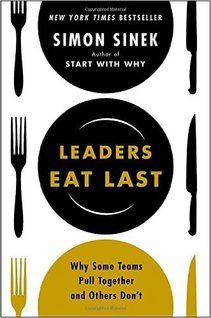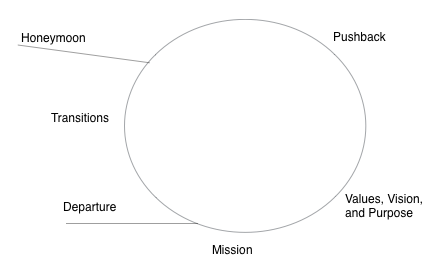 A few days ago I shared one of my passions, the next generation. I'm personally invested because I've got 2 kids, and I'm professionally invested because I spent almost 9 years in student ministry. One of my dreams as a new pastor is to see our sanctuary and property filled with kids running around and young parents chasing after them. But that's not all. As I've driven around our area my heart has been burdened by the number of 55+ communities around us. God's dream isn't just for one age group to be together, but for all. The Gospel's message is for everyone, and Gospel community involves everyone from 1 to 101. That's why I've embraced and loved the word multigenerational--bringing together people from extremely different backgrounds just by the year they were born into a community that's beyond friendship, it's family. So many times when a church wants to focus on one age group, others are left wanting and neglected. Sadly when this happens a church doesn't become a multigenerational family, it becomes congregations within congregations (young vs. old, contemporary vs. traditional, three-piece suits vs. Skinny Jeans), and it disrupts the unity of the Body that the New Testament emphasizes over and over again. I want to give 7 ways that a church can become a truly multigenerational family. 1. Invest in Next Generation ministry - Investing in these ministries (birth-young adulthood) is more than providing a budget item or space, it's an intentional effort to champion and support these ministries. Investing in them includes recruiting and developing volunteers, promotion during worship services, and inclusion in the church as a whole. Investing also includes facility structures, including safety/security, cleanliness, and accessibility (signage is huge, so is having key people to help guests). 2. Develop Pathways for Assimilation - Are there ways for people, regardless of age, to assimilate into the membership and involvement? Introducing a Prospective/New Member Orientation can help with the front door of assimilation, but beyond that are there ways to involve in small groups, opportunities to use gifts/abilities to serve, and accountability to keep the back door closed? Developing a Multigenerational mindset means asking the question "Can anyone, regardless of age, find a place here to belong?" 3. Reflect Titus 2 - One of the coolest things I learned about Millennials in my doctoral work and beyond is that this is a generation that craves mentoring. Titus 2 gives us a great pattern for older investing in younger. Younger are able to learn from the wisdom and experience of those older, and the older can be incredibly valuable to helping build a legacy. 4. Connect Generations - I love separate spaces for youth and children's ministries, because it gives them "their place" where they can learn, worship, share, and grow in their own way. Sadly what I've seen many times is that this turns into isolation--where kids and teenagers never cross paths with adults (and vice versa). I served in a church 7 years and I couldn't count how many times people would say "oh what a lovely space for the youth, I never knew this was here." Connecting generations means inviting them into each other's space. It can be a formal fellowship or it can be as easy as a middle school class inviting the widows to join them for Bible study. When we bring generations together, we're tearing down the walls that too often separate us in churches. 5. Encourage Deference > Preference - We all have preferences over what we like in music, style, fashion, sermon length, and seating arrangement. When Paul talks about his liberty in Christ, he doesn't use it to flaunt or brag about what he can do, instead he points to deference to others. So when we don't like the music or think the service should be oriented towards _____, we need to put our preferences on the back burner and instead defer to someone else. This attitude of humility, considering others more than ourselves, lets each generation see how the others flourish and thrive. So sing songs you don't know (even if they repeat, because the angels will sing Holy, Holy, Holy forever!), let a teenager talk about Christian rap, and don't roll your eyes when the Southern Gospel quartet gets up to sing. 6. Community Engagement - "If you build it, they will come" worked great for Kevin Costner, but not for churches. Becoming a multigenerational family means finding ways to be involved in the community. Contact your local schools to see if there are ways to serve as volunteers, set up a table at Open House, build relationships with retirement homes and senior centers, encourage members to coach Little League, connect with families at the pool or grocery store, and recognize the influence areas God has given you to engage people who don't know Jesus. 7. Listen - Leaders who charge all-in without listening are asking to step on a land mine. Listen well to your people, develop a vision that they will buy into. James gives us great wisdom that we should be quick to listen but slow to speak--and becoming multigenerational means that we're taking time to listen to the genuine, heart-felt concerns of people. It means we become a people who are willing to listen to each other to learn and grow, rather than a people who dismiss the other generations. When younger people learn the older ones have sacrificed and worked hard for what they have, they listen. And when older people hear the passion and enthusiasm for Christ the younger have, they cheer. It's a beautiful picture isn't it?
2 Comments
One of the things I love about living in Kentucky is how distinct every season is. And as a bonus, sometimes we can get all four in a week! But each season has its own feel, its own qualities, and its own challenges. Leaders travel through different seasons in their journey--each has its own qualities and responses. And like the calendar, leadership seasons are cyclical. Here's my best shot at how the seasons flow.  The Honeymoon season of leadership is where a new leader enters the scene and everything is exciting, new, fresh, and optimistic. If you come into a dire situation, you are viewed as a source of hope. If you come into a healthy situation, you are viewed as the successor to continue pressing on. In ministry, this is the equivalent of the "Freshman 15" for college students. Be ready for a lot of casseroles, baked goods, and people wanting to have lunch with you. The emphasis in this stage should be adjusting your family, developing relationships, and spending time talking and listening to folks. The Pushback season of leadership is when the honeymoon ends. You had this too in your marriage. This was that first fight after settling into your apartment. Our first pushback was over how to sort laundry. Sounds silly, but your first argument with your spouse probably was too. In leadership, pushback happens when you make a change or when they find out you're not Superman. It's not wrong or bad, it's reality. None of us can ever live up to the expectations or imagination of what people think a leader should be. Or pushback can come when a leader feels impressed to make a change of something that has "always been done this way." It's important for a leader to remember to that any change initiative should be done slowly, with others on board, and with careful calculation of the cost and impact on your strategy. Changing something because you don't like it is dumb. Changing something because it doesn't advance the mission or connect people to Jesus is worth exploring. But no matter how small or insignificant you think something is, it likely means something to someone. So be ready for the pushback season. How you handle this is important. Will you listen to people or will you surround yourself with yes men? Will you communicate clearly your heart and intent? Will you build a coalition of other leaders or will you go out on the ledge with a chainsaw alone? The hopeful next season after pushback is what I'll call "Values, Vision, and Purpose." This is the season where who you are starts to shape who the church is, and what's important starts to rise to the top. Maybe you've got a dream of what you want things to look like down the road? When you share that and craft that, and ultimately write it down, you're capturing a vision. When you write down your values, you're laying out what's most important to you as a church, and what you will shape your priorities, budget, programming, and emphases around. And when you lay out purpose, you are laying out why and for whom you're working. These are huge, because now you're in the season of creating new norms, of cultivating a culture, and beginning the process of transformation. Like working outside during August, this season is hard work. It requires a leader to be proactive, to be relational, and to keep the endgame in mind. It's a huge task, but effective leaders are able to wear multiple hats. The next season is Mission. This is where things click, where what's been laid out as important is now put into practice. Maybe one of your values is building strong families. At the mission season, you're developing effective next generation ministries, hosting marriage seminars, and preaching regularly on the importance of the home and family for faith formation. If you're into Tuckman's Group Stages, this is similar to the "Performing" stage. Because you've laid out a vision of where things could be, you've given people a goal to chase. Because values have been normed, there's focus on what's important. And since you've laid out purpose, people are willing to serve and take on new projects and ministries because they see the One they're serving. The last season in the cycle is Transitions. Every church is both organization and organism. People come and go, jobs will take key leaders away, funerals will mark the end of a faithful legacy of people you counted on, and new people will be moving from attender to member to minister. Along with that, healthy organizations occasionally need to go through a process of evaluation and modification. Maybe there's a ministry that once was effective but has gone past its time, or a staff member gets a shift in their job description to match a new sense of calling. These things are normal, healthy, and good. But they require transitions. A transition is different than a change. In a change, things get shuffled and flipped. But in a transition, there's an intentional effort to honor what's been done, identify who can step into the gap, and turn the page to a new chapter. So cheer on the deacon who took a new job across the country, cry with their family, and let them finish well. Then, fill the gap with another qualified leader. Because the Transition season marks a whole shift in the leader's emphasis, we renew the cycle. So after a leader goes through Transitions, they'll go through Pushback as new leaders and new processes start to take shape which are different than what had been done before. And from there it moves to the Values, Vision and Purpose, then to Mission, and again back to Transitions. What's also worth mentioning is that like Kentucky where the seasons change daily sometimes, there is some fluidity in the Pushback, Values Vision & Purpose, and Mission seasons. Sometimes you'll float back and forth between those, and that's where a leader's flexibility and adaptivity is important (for more on this, check out Situational Leadership). The season that hasn't been mentioned is the Departure season. In this, a leader is the one making the transition. But it takes a tangent off the cycle because it impacts things much differently. And in the Departure season, the church takes the initiative to make sure that the leader is able to leave well and move off the cycle. In my book Dream Teams, I talk about the importance of leaving well. It's important for a leader to make sure they are setting up the church to continue on without them, and for the church to make sure the hard work and legacy of the leader is celebrated (but not idolized). Because a Departure season naturally means a significant transition, I took it off the cycle, it's inevitable that a Departure season is going to be a "lame duck" in a lot of ways. It's hard to get behind new initiatives because the next leader will bring a different set of ideas, gifts, and personality.  A few weeks ago I was sitting in a doctor's office answering questions about how I was feeling. The questions were part of the process for the doctor to figure out what was going on with me. Individually, the symptoms weren't a huge deal, but taken together they provide a picture of what's happening. In ministry we need to regularly ask ourselves diagnostic questions about our leadership, especially when it feels like we're on the roller coaster of ups and downs. Those times, with their uncertainty and unpredictability, can be debilitating for us unless we dig into the issues. So here are 7 diagnostic questions to regularly ask yourself in ministry, but to really look at on the rough days. 1. Is your personal spiritual life growing, regular, consistent, and engaging? - In ministry we're only able to give to others what we're getting ourselves. That starts by the regular practice of spiritual disciplines, the practices we do to engage our faith. If your time in the Word isn't charging your heart, if your time in prayer isn't shaping you to be like Jesus, and if you're not regularly fasting, serving, giving, witnessing, and sharing hospitality, it's no wonder your ministry leadership feels dry. You're running on an empty tank. 2. When was the last time you dreamed? - Daydreaming is a waste of time, that's pretending you're high-fiving Lebron James when your name gets called as an NBA starter. Start practicing your jumper or start studying for that Physics test. But dreams are a whole other thing. Dreams are where the energy for our effort comes from. Dreams are where we picture an ideal future of what we want our lives and ministries to look like. Sleep studies have shown if we don't dream, we can really hurt ourselves. Are you dreaming of what your ministry could look like? Or are you content to just let things continue? 3. Is your marriage and family life balanced and healthy? - The downfall for far too many pastors who burn out or disqualify themselves happens not in the pulpit but in their home. Are you engaged with your kids or distracted by your phone? Are you involved in their lives reading bedtime stories or attending games? Do you date your wife? Are you regularly intimate (physically and emotionally)? Satan will attack your home before he attacks your church (cf. Mark 3:27), so take an assessment and see if things are strong? 4. When was the last time God answered a prayer? - James tells us we have not because we ask not (James 4:2-3) and sometimes I think that happens when we stop praying expectantly. If it's been a while since you can remember God specifically answering a prayer, check to see if your prayer life is vibrant or perfunctory. Are you praying to seek God's face and plead with Him, or are you running through your church's sick list? 5. Can you name who's shaping you and who you're shaping? - I'm a huge fan of mentoring, both to have someone shaping your life but also for you to shape someone else's. One of the best uses of a leader's time is spending time investing in another leader--that multiplies your influence. If you shape someone and are being shaped, you're constantly sharpening yourself. If your ministry influence isn't being replicated in others, you're not developing a culture of leaders, you're creating a dependency. 6. Are you reading something right now? - Ministry leaders fill their offices with books, a lot of it comes from spending 3-8 years in intensive study in seminary (especially if you're crazy enough to go for a doctorate!). But when a ministry leader doesn't have to read for class anymore, many times they fall into a trap of not regularly reading anymore. Harry Truman made it clear when he said "leaders are readers" because if you're not growing and expanding yourself as a leader, you're on your way to turning into a Dead Sea. Check out the book Lit!: A Christian Guide to Reading Books for more on sharpening yourself as a reader. Also, don't be scared to read outside of your tribe. I've gleaned so much from secular leadership books, there's so much to take from them that are observable principles of working with people. 7. Can you remember the last time you depended on faith to do something? - One thing I've learned in almost a decade of ministry is that we are trained to be risk-aversive. Risk isn't always good or wise, sometimes when we think we're taking a risk to accomplish something we're actually being stupid. But our risk aversion means that more often than not, we're not depending on faith to get anything done. We're so good at "counting the cost" that we forget to look to the Lord of the harvest. If you can't remember the last time you needed to depend on faith for something, maybe you've been depending on yourself and your ability more than God's. Take a step back and look for a BHAG that only God can accomplish, get wise counsel, and after much prayer take a leap of faith. Watch how God provides, protects, and works through you.  The best way to tell if a leader is truly invested in their people is to look at what happens when they get to a buffet line. Does the leader push his way to the front or does he let others go ahead of him? What about their place in the line? Are they content with being in the middle or are they willing to go all the way to the back, and in the process get the cold leftovers and pimento cheese? That's the big question Sinek poses in the book Leaders Eat Last, which he observed while watching a Marine Corps meal--the officers waited until all the enlisted men had gone through to eat before they did. The message behind it was clear: the goal of a leader is to make sure those under their care are taken care of first. You can check out a really helpful review of the book here, and even though Sinek isn't writing from a Christian worldview, his book has several implications for Christ-like leadership. Sinek's major arguments come from a naturalistic worldview that looks at sacrificial leadership as a survival instinct, and points out the physiology of our body chemicals (Serotonin, Dopamine, Endorphins, and Oxytocin) and their role in shaping our social bonds and personal interactions. As believers, we recognize that our body chemistry and social interactions are part of God's design and what makes us unique as His image-bearers. 1. Christian leaders can set the thermostat - Leaders have the ability to shape the culture and environment they lead in. If a leader is poised, composed, and strategic, the environment is much less chaotic than a leader who lives by a "crisis of the week" mentality. Never underestimate how much people are looking to you as a leader, they will feed off your cues, both spoken and unspoken. 2. Christian leaders lead by sacrificial service - Jesus models this for us, and Paul shares in Philippians 2 the sacrificial servanthood of Christ, who emptied Himself to the point of a servant and died in our place on the cross. As leaders, we do not lead by barking orders from the back, we lead from the front. I remember one mission trip watching a youth pastor sitting under an umbrella telling his students what to do on a construction project. If you want to lead, be willing to work harder, longer, and right there with your people. 3. Christian leaders recognize the needs of others - When we lead, we're not setting our agenda, we're serving and meeting the needs of those around us. That's why we need to be flexible with how we build our time. The desperate man whose wife just left him can't wait for you to finish your sermon prep to talk, your response as a leader is to respond to the immediate needs. It's also important to make sure the long-range needs are met, which means your agenda as a leader becomes their agenda. 4. Christian leaders need to have the big picture in mind - Leadership isn't doing what Jack Welch at GE did, which was create a spirit of fear among managers and a roller coaster of performance. It instead looks like Costco, that recognizes the value of employees and making sure they can thrive at work by thriving at home. It's what I love about Southwest Airlines, their primary focus is their employees, because they know if they take care of their people they will take care of the customers. As a Christian leader, we need to keep the big picture in mind, looking ahead to what will make the most lasting impact. One question I ask often as a student pastor is "What do I want them to take with them when they graduate in 3/4/5/6/7 years?" That helps me frame everything we do in a way that equips them for living as Gospel witnesses. 5. Trust is the currency we lead with - Whenever we lead as Christian leaders, we're doing so in the crucible of relationships. Our effectiveness as a leader only goes as far as the depth, quality, and breadth of our relationships. The currency we spend in this is trust. As we develop relationships and build into people, they give us trust deposits. Occasionally we need to cash those deposits in to make a difficult decision, change, or navigate through the rhythm of conflict resolution. These withdrawals are a necessary element of leadership, and the more people trust us, the more we're able to lead, inspire, and cast vision.  When I was in college serving on our BCM Leadership Team, I was introduced to BHAGs (Big Hair Audacious Goals). We were a group of about 40 who were gathering to pray, plan, and dream about engaging and reaching a campus of almost 20,000 students. We knew we would have to be Big and Hairy to accomplish that. Anything else would fall short of what we believed God was calling us to do. It was really cool to watch that year as we saw record numbers of freshmen involved, students engaging in almost every aspect of campus life, targeted outreach and engagement for commuter students, and countless leaders serving in churches now being developed. Ministry's unique difficulties and challenges require a leader to have BHAGs. Here's 3 reasons why: 1. Leaders without dreams are maintainers - The biggest difference between leaders and managers/maintainers is that a leader sets forth a dream for what can be accomplished, while a manager/maintainer just does what's before them. Sleep research is undeniable that without dreams we cannot function, dreams give us our motivation and creativity. Without dreaming, a leader becomes nothing more than a maintainer of what's already there. They may do some good things, but they'll never change the world like Steve Jobs once asked John Sculley. 2. God-sized goals require God-sized faith - William Carey, who many consider to be the father of modern missions, once said "Expect great things from God, attempt great things for God." Engaging the nations with the Gospel for Carey was something that only God could do, so he set a God-sized goal. Too often we make our goals small enough that they're easy to reach, and don't require us to stretch our faith. What happens when leaders are regularly setting BHAGs is they're attempting things that only God can do, and they're growing in their faith as they learn to depend on Him to accomplish those goals. I remember my pastor in seminary setting a God-sized goal of seeing people almost weekly saved/baptized. As that God-sized goal matured, it turned into Upward Basketball & Soccer, where every week hundreds of our unchurched and lost neighbors were on our property. We had a 70 year old grandpa get saved because of that, and I remember our pastor's reaction: "Wow." 3. BHAGs foster a culture of vision - This past year we took our first family vacation to St. Louis, about a 5 hour drive. Which for a preschooler = Eternity! How did we survive (besides singalong CDs)? We kept the vision in front of him of what we'd get to do in the Gateway City. Leaders have to be visionaries, and BHAGs develop a culture where vision is not only accepted but championed. Vision is the fuel that pushes through the difficult days. Vision is what kept Moses pointing to the Promised Land, Nehemiah to the completed wall, Paul to the Gospel proclaimed throughout the world, and for John to say to a persecuted church that in the end Jesus wins. If we fail to regularly set BHAGs as leaders, we're setting our people up to just get by. BHAGs give something to aim for, something greater than ourselves. Later this week I'll bring all you dreamers back to reality with SMART goals, and also how to balance these two critically important leadership tasks. |
Scott M. DouglasA blog about leadership and the lasting legacy of family ministry. Archives
August 2023
Categories
All
|

 RSS Feed
RSS Feed



